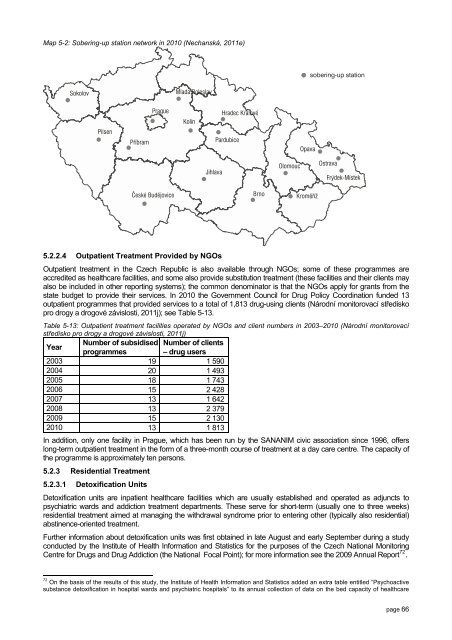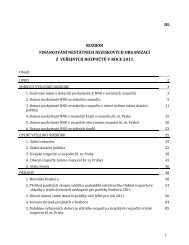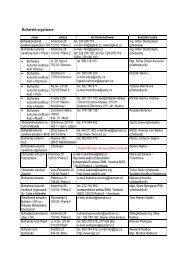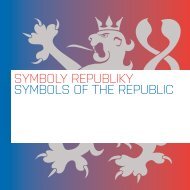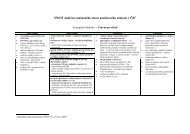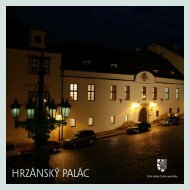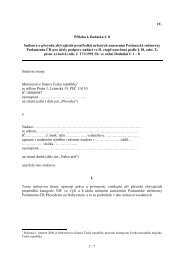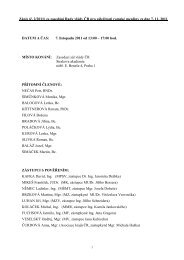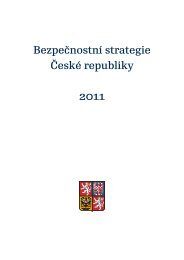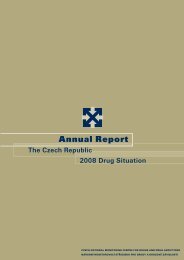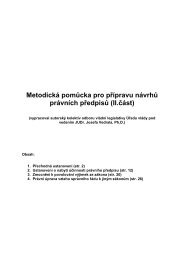The Czech Republic Annual Report 2010 Drug ... - Drogy-info.cz
The Czech Republic Annual Report 2010 Drug ... - Drogy-info.cz
The Czech Republic Annual Report 2010 Drug ... - Drogy-info.cz
Create successful ePaper yourself
Turn your PDF publications into a flip-book with our unique Google optimized e-Paper software.
Map 5-2: Sobering-up station network in <strong>2010</strong> (Nechanská, 2011e)<br />
5.2.2.4 Outpatient Treatment Provided by NGOs<br />
Outpatient treatment in the <strong>Czech</strong> <strong>Republic</strong> is also available through NGOs; some of these programmes are<br />
accredited as healthcare facilities, and some also provide substitution treatment (these facilities and their clients may<br />
also be included in other reporting systems); the common denominator is that the NGOs apply for grants from the<br />
state budget to provide their services. In <strong>2010</strong> the Government Council for <strong>Drug</strong> Policy Coordination funded 13<br />
outpatient programmes that provided services to a total of 1,813 drug-using clients (Národní monitorovací středisko<br />
pro drogy a drogové závislosti, 2011j); see Table 5-13.<br />
Table 5-13: Outpatient treatment facilities operated by NGOs and client numbers in 2003–<strong>2010</strong> (Národní monitorovací<br />
středisko pro drogy a drogové závislosti, 2011j)<br />
Year<br />
Number of subsidised Number of clients<br />
programmes – drug users<br />
2003 19 1 590<br />
2004 20 1 493<br />
2005 18 1 743<br />
2006 15 2 428<br />
2007 13 1 642<br />
2008 13 2 379<br />
2009 15 2 130<br />
<strong>2010</strong> 13 1 813<br />
In addition, only one facility in Prague, which has been run by the SANANIM civic association since 1996, offers<br />
long-term outpatient treatment in the form of a three-month course of treatment at a day care centre. <strong>The</strong> capacity of<br />
the programme is approximately ten persons.<br />
5.2.3 Residential Treatment<br />
5.2.3.1 Detoxification Units<br />
Detoxification units are inpatient healthcare facilities which are usually established and operated as adjuncts to<br />
psychiatric wards and addiction treatment departments. <strong>The</strong>se serve for short-term (usually one to three weeks)<br />
residential treatment aimed at managing the withdrawal syndrome prior to entering other (typically also residential)<br />
abstinence-oriented treatment.<br />
Further <strong>info</strong>rmation about detoxification units was first obtained in late August and early September during a study<br />
conducted by the Institute of Health Information and Statistics for the purposes of the <strong>Czech</strong> National Monitoring<br />
Centre for <strong>Drug</strong>s and <strong>Drug</strong> Addiction (the National Focal Point); for more <strong>info</strong>rmation see the 2009 <strong>Annual</strong> <strong>Report</strong> 72 .<br />
72<br />
On the basis of the results of this study, the Institute of Health Information and Statistics added an extra table entitled ”Psychoactive<br />
substance detoxification in hospital wards and psychiatric hospitals” to its annual collection of data on the bed capacity of healthcare<br />
page 66


